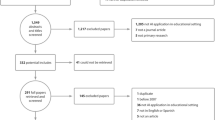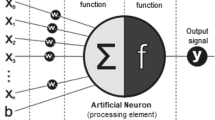Abstract
Educational Data Science has meant an important advancement in the understanding and improvemen of learning models in recent years. One of the most relevant research topics is student performance prediction through click-stream activity in virtual learning environments, which provide abundant information about their behaviour during the course. This work explores the potential of Deep Learning and Meta-Learning in this field, which has thus far been explored very little, so that it can serve as a basis for future studies. We implemented a predictive model which is able to automatically optimise the architecture and hyperparameters of a deep neural network, taking as a use case an educational dataset that contains information from more than 500 students from an online university master’s degree. The results show that the performance of the autonomous model was similar to the traditionally designed one, which offers significant benefits in terms of efficiency and scalability. This also opens up interesting areas of research related to Meta-Learning applied to educational Big Data.











Similar content being viewed by others
Code Availability
All code for data analysis and model training associated with the current submission is available at https://colab.research.google.com/drive/1pQNm36nEgA83FGqno-HvJH8AJRpoFmlj?usp=sharing
References
The Open University (2020) OU50. www2.open.ac.uk. http://www2.open.ac.uk/about/annual-report-2018-19/#highlights.. Accessed 8 October 2020
Guerrero M, Heaton S, Urbano D (2021) Building universities’ intrapreneurial capabilities in the digital era: The role and impacts of massive open online courses (MOOCs). Technovation 99:102139. https://doi.org/10.1016/j.technovation.2020.102139
Class Central (2020) The second year of the MOOC: a review of MOOC stats and trends in 2020. https://www.classcentral.com/report/the-second-year-of-the-mooc/. Accessed 8 October 2020
Liñán LC, Pérez ÁAJ (2015) Minería de datos educativos y análisis de datos sobre aprendizaje: Diferencias, parecidos y evolución en el tiempo. RUSC Univ Knowl Soc J 12(3):98–112. https://doi.org/10.7238/rusc.v12i3.2515
Jovanović J., Gašević D., Dawson S, Pardo A, Mirriahi N (2017) Learning analytics to unveil learning strategies in a flipped classroom. Internet High Educ 33:74–85. https://doi.org/10.1016/j.iheduc.2017.02.001
Waheed H, Hassan SU, Aljohani NR, Hardman J, Alelyani S, Nawaz R (2020) Predicting academic performance of students from VLE big data using deep learning models. Comput Hum Behav 104. https://doi.org/10.1016/j.chb.2019.106189
Montavon G, Samek W, Müller KR (2018) Methods for interpreting and understanding deep neural networks. Elsevier Inc. https://doi.org/10.1016/j.dsp.2017.10.011, vol 73, pp 1–15
Vanschoren J (2019) Meta-learning. In: Hutter F, Kotthoff L, Vanschoren J (eds) Automated machine learning. The springer series on challenges in machine learning. Springer, Cham. https://doi.org/10.1007/978-3-030-05318-5_2
Zoph B, Vasudevan V, Shlens J, Le Q (2018) Learning transferable architectures for scalable image recognition. In: Proceedings of the IEEE computer society conference on computer vision and pattern recognition. https://doi.org/10.1109/CVPR.2018.00907, pp 8697–8710
Finn C, Abbeel P, Levine S (2017) Model-agnostic meta-learning for fast adaptation of deep networks. In: Proceedings of the 34th international conference on machine learning - volume 70 (ICML’17). JMLR.org, pp 1126–1135
Romero C, Ventura S (2020) Educational data mining and learning analytics: An updated survey. WIREs Data Min Knowl Discov 10(3). https://doi.org/10.1002/widm.1355
Kuzilek J, Hlosta M, Zdrahal Z (2017) Data descriptor: open university learning analytics dataset. Sci Data 4:1–8. https://doi.org/10.1038/sdata.2017.171
Coelho OB, Silveira I (2017) Deep learning applied to learning analytics and educational data mining: a systematic literature review. In: Anais Do XXVIII Simpó,sio Brasileiro de Informática Na Educação (SBIE 2017). https://doi.org/10.5753/cbie.sbie.2017.143, p 143
Hassan SU, Waheed H, Aljohani NR, Ali M, Ventura S, Herrera F (2019) Virtual learning environment to predict withdrawal by leveraging deep learning. Int J Intell Syst 34(8):1935–1952. https://doi.org/10.1002/int.22129
Fei M, Yeung DY (2016) Temporal models for predicting student dropout in massive open online courses. In: Proceedings - 15th IEEE International conference on data mining workshop, ICDMW 2015. https://doi.org/10.1109/ICDMW.2015.174, pp 256–263
Naser SA, Zaqout I, Ghosh MA, Atallah R, Alajrami E (2015) Predicting student performance using artificial neural network: in the faculty of engineering and information technology. Int J Hybrid Inf Technol 8(2):221–228. https://doi.org/10.14257/ijhit.2015.8.2.20
Strecht P, Cruz L, Soares C, Mendes-Moreira J, Abreu R (2015) A comparative study of classification and regression algorithms for modelling students’ academic performance. In: 8th international conference on educational data mining
Zaffar Maryam, Ahmed Hashmani Manzoor, Savita KS, Rizvi Syed Sajjad Hussain (2018) A study of feature selection algorithms for predicting students academic performance. Int J Adv Comput Sci Appl (IJACSA) 9(5). https://doi.org/10.14569/IJACSA.2018.090569
Yeoh TW, Daolio F, Aguirre HE, Tanaka K (2017) On the effectiveness of feature selection methods for gait classification under different covariate factors. Appl Soft Comput J 61:42–57. https://doi.org/10.1016/j.asoc.2017.07.041
Elsken T, Metzen JH, Hutter F (2019) Neural architecture search: a survey. J Mach Learn Res 20. http://jmlr.org/papers/v20/18-598.html
Bergstra J, Bardenet R, Bengio Y, Kégl B. (2011) Algorithms for hyper-parameter optimization. In: Advances in neural information processing systems 24: 25th annual conference on neural information processing systems 2011, NIPS 2011, pp 1–9. https://doi.org/10.1007/978-3-030-05318-5_1
Liu H, Simonyan K, Yang Y (2019) DARTS: Differentiable architecture search. In: 7th international conference on learning representations, ICLR 2019. arXiv:1806.09055
Pham H, Guan MY, Zoph B, Le Qv, Dean J (2018) Efficient neural architecture search via parameters sharing. In: Proceedings of the 35th international conference on machine learning, PMLR, vol 80. pp 4095–4104
Jin H, Song Q, Hu X (2018) Auto-Keras: An efficient neural architecture search system. In: Proceedings of the 25th ACM SIGKDD international conference on knowledge discovery & data mining (KDD ’19). Association for Computing Machinery, New York, pp. 1946-1956. https://doi.org/10.1145/3292500.3330648
Real E, Moore S, Selle A, Saxena S, Suematsu YL, Tan J, Le Qv, Kurakin A (2017) Large-scale evolution of image classifiers. In: Proceedings of the 34th international conference on machine learning - Volume 70 (ICML’17). JMLR.org, pp 2902– 2911.
Funding
This work has been partially funded by the PLeNTaS project, “Proyectos I+D+i 2019”, PID2019-111430RB-I00 and by Universidad Internacional de La Rioja (UNIR, http://www.unir.net) through the IBM-UNIR Chair on Data Science in Education.
Author information
Authors and Affiliations
Contributions
Ángel Casado Hidalgo carried out the experiment and wrote the manuscript with support from Pablo Moreno Ger. Luis De La Fuente Valentín helped to supervise the project. All authors read and approved the final manuscript.
Corresponding author
Ethics declarations
Conflict of Interests
The authors declare that they have no conflicts of interest.
Additional information
Availability of data and material
The data which supports the findings of this study are available from the International University of La Rioja but restrictions apply to the availability of this data, which was used under license for the current study, and so are not publicly available. However, data is available from the authors upon reasonable request and with the permission of the International University of La Rioja.
Publisher’s note
Springer Nature remains neutral with regard to jurisdictional claims in published maps and institutional affiliations.
Rights and permissions
About this article
Cite this article
Hidalgo, Á.C., Ger, P.M. & Valentín, L.D.L.F. Using Meta-Learning to predict student performance in virtual learning environments. Appl Intell 52, 3352–3365 (2022). https://doi.org/10.1007/s10489-021-02613-x
Accepted:
Published:
Issue Date:
DOI: https://doi.org/10.1007/s10489-021-02613-x




